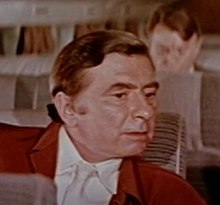
Back Robert Newton Afrikaans رابرت نیوتن AZB Robert Newton Catalan Robert Newton German Robert Newton Spanish رابرت نیوتن Persian Robert Newton Finnish Robert Newton French Robert Newton Irish Robert Newton Galician
Robert Newton | |
|---|---|
 Newton in The High and the Mighty (1954) | |
| Born | Robert Guy Newton 1 June 1905 Shaftesbury, Dorset, England |
| Died | 25 March 1956 (aged 50) |
| Resting place | Cremated; ashes scattered in the waters of Mount's Bay, Cornwall[1] |
| Occupation | Actor |
| Years active | 1923–1956 |
| Spouses |
|
| Children | 3 |
Robert Guy Newton (1 June 1905 – 25 March 1956) was an English actor. Along with Errol Flynn, Newton was one of the more popular actors among the male juvenile audience of the 1940s and early 1950s, especially with British boys.[2] Known for his hard-living life, he was cited as a role model by the actor Oliver Reed and the Who's drummer Keith Moon.[2]
Beginning his career in theatre in the 1920s, Newton appeared in numerous plays in the West End, including Bitter Sweet by Noël Coward. In 1939 he was Horatio in Hamlet at the Old Vic theatre opposite Laurence Olivier's Prince Hamlet. After serving in the Royal Navy during the Second World War, he had his major break on screen playing the lead in This Happy Breed (1944) and starring in Olivier's version of Henry V (1944). These appearances saw British exhibitors vote him the 10th most popular British film star of 1944.[3]
Newton is best remembered for his portrayal of the feverish-eyed Long John Silver in the 1950 RKO-Disney British adaptation of Treasure Island, the film that became the standard for screen portrayals of historical pirates. He starred as Edward Teach (Blackbeard) in Blackbeard the Pirate in 1952 and Long John Silver again in the 1954 film of the same title, which spawned a miniseries in the mid-1950s. Born in Dorset in the West Country of England and growing up in Cornwall near Land's End, his exaggeration of his West Country accent is credited with popularising the stereotypical "pirate speech".[2][4][5] Newton has become the "patron saint" of the annual International Talk Like a Pirate Day.[6]
- ^ Robert Newton (1905-1956) Archived 23 December 2010 at the Wayback Machine (britmovie.co.uk).
- ^ a b c Angus Konstam (2008) "Piracy: The Complete History". p.313. Osprey Publishing, Retrieved 11 October 2011
- ^ Cite error: The named reference
Quiglywas invoked but never defined (see the help page). - ^ Parry, Dan (2006). Blackbeard: The Real Pirate of the Caribbean. p. 174. National Maritime Museum
- ^ "The Source of the Pirate's "Arrr!"". 28 April 2018.
- ^ Mark Baker (19 September 2003). "Avast! No lubbers today, ye scurvy bilge rats!". The Register-Guard. Retrieved 26 October 2014.